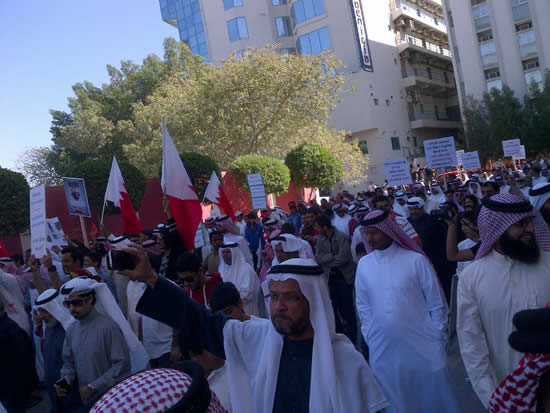The Obama Administration: Ill-Informed on Bahrain
Morgan Lorraine Roach /
Last Friday, Bahrainis held a peaceful, though spirited, rally in front of the United Nations headquarters in Manama to protest what they consider to be misguided foreign efforts to pressure Bahrain’s government to make dangerous concessions to uncompromising opposition leaders, some of whom are linked to Iran.
Bahrainis, particularly those loyal to the ruling Al-Khalifa family, are outraged by what they consider the Obama Administration’s favoritism for an increasingly violent opposition movement. Dubbed “Hands off Bahrain,” demonstrators delivered a clear message to the United State government: “Back off.”
Since the crisis began last February, sparked by the “Arab Spring,” Bahrain’s government has grappled with the restoration of order. Initiated by a youth movement demanding government reform, demonstrations were quickly hijacked by the opposition party, al-Wefaq, and other actors, including Shia cleric Isa Qassim. Iran, as it has done repeatedly in the past, has also played a significant—though covert—role in inspiring unrest. In response, Bahrain’s security forces quickly issued a brutal crackdown that was later assessed in detail by the Bahrain Independent Commission of Inquiry (BICI).
Despite the government’s attempts to implement the recommendations of the BICI and political reforms created through the National Dialogue, the opposition demands more. However, these demands are often vague and inconsistent. While al-Wefaq and four other opposition groups have outlined their demands—which include drastic political reforms—its supporters are throwing Molotov cocktails at police and calling for the downfall of the royal family.
The Obama Administration has mistakenly treated Bahrain, which is governed by one of the most liberal governments in the Gulf, the same way it has treated other countries dominated by much more oppressive authoritarian regimes that have been affected by the “Arab Spring.” The Administration has hedged its bets in favor of the opposition. Such moves reveal how uninformed the Administration is to the events on the ground.
Last September, in his speech to the U.N. General Assembly, President Obama effectively legitimized al-Wefaq’s influence when he urged Bahrain’s government to make additional reforms to appease al-Wefaq. Last October, the State Department also blocked a $53 million arms sale to Bahrain, claiming that the sale wouldn’t go through until Washington’s demands for reform were met.
While the sale of some military equipment was announced last week, some Members of Congress are furious at what they perceive as rewarding Bahrain’s government for too little progress, despite the fact that the arms sale is for Bahrain’s external military use and in support of the U.S. Navy’s Fifth Fleet. The U.S. embassy in Bahrain has also come under heavy criticism after it was revealed that State Department officials met with al-Wefaq leaders.
Giving such credence to al-Wefaq, the Administration fails to consider what would happen to Bahrain if the monarchy falls to the opposition. Al-Wefaq has made no secret that, if it comes to power, the U.S. Navy’s Fifth Fleet, a major bulwark in containing Iran, would have a limited future. Iran, which considers Bahrain its lost 14th province, would also expand its influence and destabilize the region.
Bahrain’s government is far from perfect, and some of the opposition’s claims are legitimate. However, considering that Bahrain achieved independence from Britain in 1970, the small island kingdom has made remarkable progress in building a pluralistic and open society that respects freedom of religion, women’s rights, and economic freedom. The Obama Administration should not sacrifice an important ally in the Gulf region in a misguided effort to appease opposition leaders with dubious democratic credentials who are backed by Iran.
Pushing Bahrain to surrender to Islamist political parties intent on building a tyranny of the majority would not create a genuine democracy but would only strengthen Iranian influence, enhance its growing threat to other Persian Gulf states, and damage U.S. efforts to contain Iran, a major threat to freedom in the Middle East.

